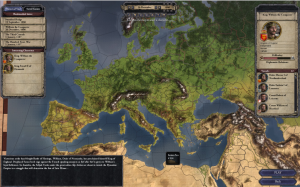Trending
Opinion: How will Project 2025 impact game developers?
The Heritage Foundation's manifesto for the possible next administration could do great harm to many, including large portions of the game development community.
The Game Industry is facing a severe issue of devaluing content which has been our fault and part of it has to do with the problem of understanding and evaluating game design.

Building off of a conversation with Jon Shafer I had, I want to discuss the topic of trying to put a value on game design. As not only is this a major issue among both indie and major developers, but it has certainly changed the way we think about buying video games.

Candy Crush Saga, originally posted on Cnet
As we've talked about time and time again, video games have gone down in value despite the rising cost of game development. The number of games being put out by the indie community and the increase focus on sales has altered the buying mentality when it comes to games. Where I was once spending $50+ for a single game, today I can buy games at $10 or less without much work.
Where the work is going however is on the developer's side where they have to wear their marketing hat to figure out the best price for their games. And that is where the problem comes from as everyone is lowering the price of their game. Consumers are demanding lower prices due to the sheer quantity of titles being made and this presents an issue with trying to establish a pricing structure.
Unlike other markets, video games have no true pricing scale in the sense that a game's design doesn't equate to how much its worth. This is a huge difference from physical markets where you have an object; you know what was put into it, the name associated with it and the rarity, allowing you to assign a value to it.
But video games as a digital medium only have the work that was put into making it and even then, the process of game development is still a mystery to most people. There is no rarity with digital copies and name really doesn't mean much in today's market. The only two things that are factored in are the gameplay and the price.
And because of that, every video game is treated the same in the eyes of the consumer: A product that all but the hardcore fans are waiting for rock bottom prices to buy. And this is where as someone who is both a consumer and invested in the industry that I'm conflicted on.

GTA 5, originally posted on Forbes.com
Only a handful of AAA games retain their value like GTA 5, while the rest will slowly creep down into the $30 or less territoryAs a consumer, I completely admit to being on the frugal side when it comes to game buying these days.
After spending almost three decades buying titles at full price, today it takes a lot for me to spend $15 or more on a single game, despite where it's coming from. And even if it's something that I'm interested in buying, I still find myself waiting for any kind of sale.
But as someone who knows the work that goes into game development and how for many people, a single game's success could make or break them, I want them to succeed.
The debate that is going on between consumers and developers has to do with short term vs. long term profits. If everybody just bought games at full price (or slightly discounted,) developers could make a profit very quickly. However, with sales and massive discounts, a developer will earn money, but it will take a longer time before they can see a profit in most cases.
The bigger concern is that by being conditioned to wait for lower prices and without having a dedicated pricing guide, developers are risking pricing themselves out of a sale or the general market despite the quality of the game. Jon talked about this on the cast with how he's going to price At The Gates for $30 and has already received complaints from people saying that's too high.
But again this goes back to that simple question: What's the right price for a video game? Should graphic quality affect the price? What about gameplay? Should being a FPS automatically add $10 to the price?

Crusader Kings 2, originally posted on Steam
Strategy titles thanks to their rarity these days, retain their value due to a small but hardcore community of consumers.The only thing we know for sure is that at the end of the day, the consumer will always dictate the actual value and that is a very dangerous mindset facing developers.
As we talked about on the cast, if everyone decides that all video games must be 99 cents or less to sell, that's going to destroy the market as only a subset of developers will be able to make a living off of that.
One point that Jon made during the cast was that strategy games due to their rarity these days still hold value compared to other genres. Both Paradox Software and Strategy First continue to put out titles either at full price or higher than normal retail price. Due to their games coming out rarely and have the replayability to backup spending the money.
But the same can't be said of other genres such as platformers, where anyone can design one without much effort. Sure it takes a lot of knowledge to create one with the same level of design of Super Meat Boy or Mario, but it's hard to argue buying a game for a few bucks despite its actual quality.
The use of game sales is continuing to grow and with Steam cards and other promotions, stores and publishers are finding more ways to convince you to spend money. But as free to play continues to be a popular buzz word, we don't know how this will all play out. Will game value continue to decline or will things reach a point of stabilization?
While being a bargain hunter is not a bad thing, if we're not careful we may end up getting rid of anything that's worth hunting for.
(For more posts on game design and the industry along with weekly podcasts, check out Game-Wisdom)
Read more about:
BlogsYou May Also Like